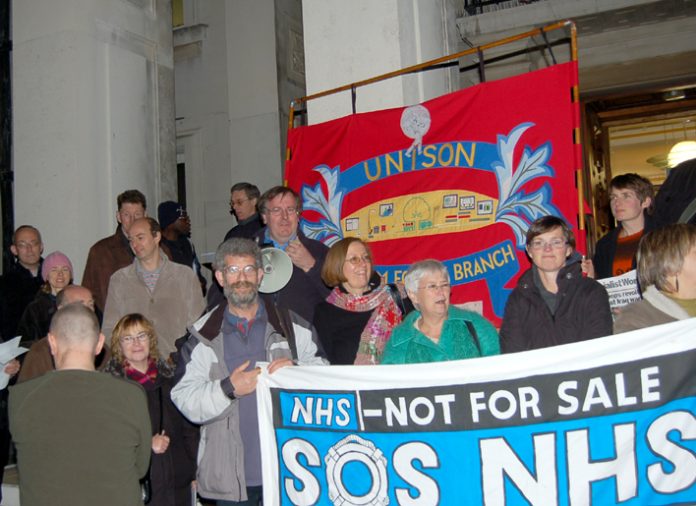
Shocked health unions yesterday warned against prime minister Blair’s plans to close a large number of District General Hospitals’ Accident & Emergency departments and replace them with a few ‘Regional Specialist Centres’.
UNISON Head of Health, Karen Jennings, said: ‘We are extremely concerned that these policies may be being driven by deficits, not what is best for patient care.
‘If we move towards more specialist units we still need to ensure that patients have access to really good local A&E departments.
‘The strength of building specialist units and advancing specialist medical knowledge should be in sharing that expertise and cascading it down.
‘However, in reality the new markets, commercial confidentiality and competition being fostered by the government in the NHS create obstacles to hospitals working together.’
Royal College of Nursing (RCN) General Secretary Dr Beverly Malone said: ‘Experience shows that good local services improve patient outcomes and save lives.
‘That’s why they are so valued and that’s why people are campaigning to save them up and down the country.
‘So, any changes to local services should always be clinically informed and based on patient need, not driven by economic imperatives and cost cutting.’
Dr Jonathan Fielden, Chairman of the British Medical Association’s Consultants’ Committee said that ‘patients must still have local access to emergency care’.
He added: ‘All too often change is driven by politics or the need to balance the books rather than what is in the best interests of patients.’
Fielden warned: ‘Delivering effective emergency care will rely on hospitals, GPs and other primary care clinicians, working collaboratively to plan how services will be provided.
‘This is impeded when at the same time hospitals are being encouraged to compete against each other to attract more patients to maintain financial viability in a market based healthcare system.’
Mr Don MacKechnie, Chairman of the BMA’s Emergency Medicine Committee also warned: ‘There is a risk that these government policies will destabilise and fragment NHS care, and the ability to reorganise services to meet the needs of patients is actually reduced.’
Blair told an audience of Primary Care Trust managers that ‘we are in the decisive phase of reform. This is the watershed moment, when we pass from one type of system to another.’
He claimed that ‘the elderly can be looked after at home’ and ‘diagnostics tests and minor surgery can be carried out near to home’.
Blair claimed: ‘Lots of people come straight to A&E who would, for a variety of reasons, be better treated elsewhere.
‘For example, paramedics can administer life-saving drugs to heart attack and stroke victims on the doorstep.’
Recommending ‘specialist centres of excellence’, he said that ‘the patient gets a more specialised service, in most cases closer to home. This ranges from immediate telephone access to information, assessment and advice on self-care or the best place to seek further help, through to home visits and access to centres of care.’
But he added: ‘There will be many more paramedics and nurses trained to treat people at home and stabilise a patient’s condition for longer journeys.’